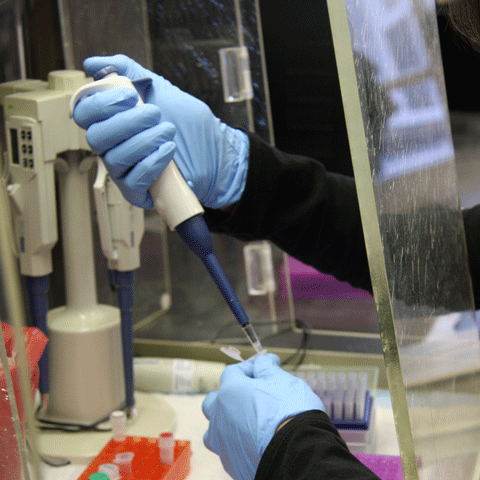
Fox Chase Awarded Prestigious Training Grant for 40th Year in a Row
-
The Ruth L. Kirschstein Institutional National Research Service Award will provide funding for 10 postdoctoral positions in various labs at Fox Chase for five years. Trainees are funded by the grant for a maximum of two years.
Working in each of the Center’s labs are graduate students earning their PhDs and postdoctoral students who already hold a PhD but are still training. Approximately 80 postdoctoral fellows work at Fox Chase.
“The real engines for progress here at the Center are our trainees,” said Glenn Rall, PhD, director of the Postdoctoral Program at Fox Chase.
The critical funding provided by the grant allows for breathing room in the budget and allows principal investigators to hire other trainees, according to Rall.
“The biggest benefit is for the trainees,” he said. “It’s a feather in their cap to say they were funded on this grant. It shows faith in them as a scientist.”
Trainees Finding Success After Fox Chase
As part of the review process, the Application Committee looks at the Center’s track record of success and at how scientists who received funding under the grant have flourished. All members of the Application Committee awarded Fox Chase the highest possible score. Receiving full funding and perfect marks indicates that Fox Chase trainees are finding great success after completing their training, according to Rall.
“The faculty who support our trainees care that we provide useful content at this pivotal stage in their careers,” he said. “I’m just thrilled because it feels like a validation of the program we’ve built here.”
In addition to the challenges of working in a lab, some trainees may find it overwhelming and discouraging as they try to receive grant funding in such a competitive environment.
“It’s a difficult job being a scientist,” Rall said. “Most days will end in disappointment, not discovery.”
Therefore, at Fox Chase, postdoctoral training includes education on how to write the best possible grants to get funding and how to review grants to help colleagues.
“When someone gets a grant, we all celebrate,” Rall said. “More than any other place, there’s a sense of a rising tide floats all boats. We all get better as a consequence ... Helping build these networks is how science will move forward expeditiously.”
Grant Provides Funding and Support System
Ashley Mentlik James, who works in the lab of Kerry S. Campbell, PhD, director of the Cell Culture Facility, was funded on the grant for two of the four years she has been at Fox Chase.
“The best part about it was knowing I would have this support system and the funding,” she said. “It’s important to know you’re safe. It’s really tough for an early-career scientist not knowing the ins and outs of writing big grants. Having this in house is absolutely a big deal and a great help.”
Beyond the peace of mind of being funded for two years, trainees funded by the grant are able to get to know one another and form collaborations, both personally and professionally.
“Everyone else who is on that grant will come together on different things,” Mentlik James said. “You’re not alone. There’s a group of 10 of us who can help and are going through the same thing. There’s a network in place for the duration of our careers.”
Shawn Fahl has been training at Fox Chase in the lab of David Wiest, PhD, deputy chief scientific officer and coleader in blood cell development and function, for three years and was funded by the training grant for two of those years.
“With this grant, just knowing that for the next two years you will have funding, it relieves a lot of pressure,” Fahl said. “It brings freedom to just focus on your research and not worry about where the next chunk of money is going to come from.”
In addition to focusing on his research, the grant has allowed Fahl to explore other professional interests, like teaching. The grant also provides funding for Rall to bring in outside speakers to talk to postdoctoral fellows about their career options, which Fahl finds especially helpful.
“It’s been great to have that career development aspect,” he said. “That Fox Chase already had a training grant made it much more attractive to me to come here.”
Two years ago, Peter Huwe wanted to join the lab of Roland Dunbrack, Jr., PhD, director of the Molecular Modeling Facility, at Fox Chase but there was no guarantee that funding would be available to bring Huwe on board. He applied for the training grant, which allowed him to join the Center and the lab.
The nature of the grant has allowed Huwe to explore a variety of interest areas, which has been helpful as he works on developing his career.
“Had I come in on a different grant, I would have been restricted,” he said. “It’s afforded me the independence to pursue my own projects, which has been really fantastic. It does exactly what it is built to do: to train you for the career you want.”
